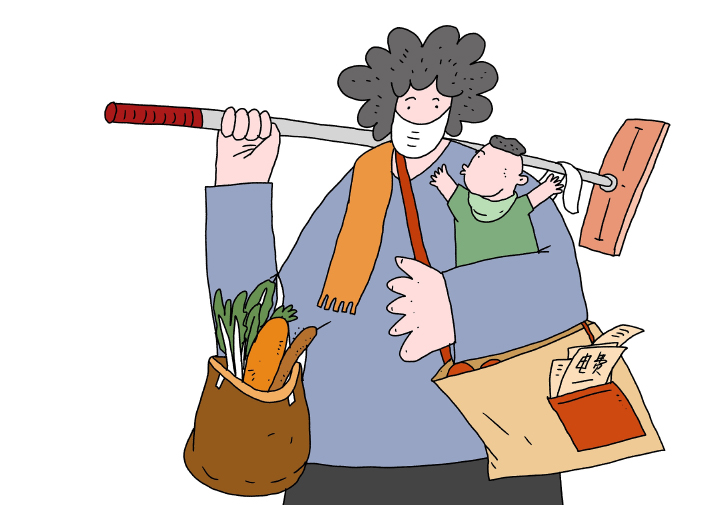| China |
| Housewives in China can demand household labor compensation in divorce | |
|
|
 A mother reads a book to her child in a library in Taiyuan, Shanxi Province on February 16 (XINHUA)
After equally dividing community property with her husband, a housewife in Fujian Province received an additional 550,000 yuan ($85,000) in "household labor compensation." The verdict was made by a local court in July. It is one of several cases nationwide that saw housewives receive divorce compensation for additional domestic duties this year, thanks to an article in China's Civil Code, the civil law promulgated last year that went into force on January 1. The woman in this particular case, who had married to her husband for more than 20 years, obtained higher compensation than other such cases earlier this year, in which the housewives got between 15,000 yuan ($2,320) and 120,000 yuan ($18,550). Pay for the unpaid Article 1088 in the Civil Code stipulates, "Where one spouse is burdened with additional duties for raising children, looking after the elderly, or assisting the other spouse in his or her work, the said spouse has the right to request compensation upon divorce against the other party, and the other party shall make due compensation." "This article is derived from an article in the Marriage Law," said Li Shuangqing, a lawyer with Beijing Dentons Law Firm. The Marriage Law was abolished following the implementation of the Civil Code. "That article in the Marriage Law also supported divorcing spouses to request such compensation, but only on the condition of signing a prenuptial agreement. As it is rare for couples to sign this type of agreement in China, the request was previously uncommon in divorce proceedings." Today, the article in the Civil Code makes the request much easier as it doesn't require a prenuptial agreement. "It applies to both women and men applying for divorce, whoever shoulders additional duties in the household, basically," Li said. So far, all the requests have been submitted by housewives. The first one to receive the recompense was a housewife surnamed Wang from Beijing. It was her lawyer, also a woman, who suggested she make the appeal. The 30-year-old housewife got married in 2015. One year later, she left work and chose to become a housewife. In the following three years, she did most of the household work, including taking care of the children and maintaining the house. Her husband first filed for divorce in 2019. When he filed for a third time, the revised Civil Code had just taken effect. The woman followed her lawyer's suggestion and asked for a domestic work compensation of 180,000 yuan ($27,800). The husband concurred with all the efforts his spouse had made in their home but disagreed with the actual number. Finally, the court ruled that the man owed his soon-to-be ex-wife a total of 50,000 yuan ($7,732). This case soon sparked many an online discussion. While hailing the verdict as a recognition of housework being an occupation, many netizens complained that the compensation for a housewife of more than three years in Beijing is less than the standard pay for a cleaning lady in the capital city. Feng Miao, a judge, clarified the reasoning behind the final decision. "It is difficult to quantify household labor and we can't simply compare the compensation to a housekeeper's salary," Feng told Beijing-based People magazine. Feng explained that in this case, the husband's salary was less than 8,000 yuan ($1,237) per month. The couple didn't buy a house or car during their years of marriage and only possessed the total common savings of 26,000 yuan ($4,020). "If we set the number too high, the husband won't be able to afford it and then all will become void of any meaning," Feng said. "The compensation in a way can lend some sense of support to housewives considering divorce—some housewives don't want to get divorced, not because they still love their husbands but because they worry about the aftermath, they fear that they can't live on—with no money to their name." Li, the lawyer, said many have misunderstood the clause. "The compensation is assigned on the condition that the couple has already split any communal property between them, which means the one doing housework at home already obtains an equal portion of the other's income coming in from outside," Li said. "So, the compensation intends to ensure the one who leaves the workforce due to household duties is better prepared financially when adapting to society following a separation." Despite the debates regarding the amount of the compensation, the case has created a precedent. In April, a Chongqing housewife received a domestic work recompense of 120,000 yuan ($18,568). In June, a housewife in Guangxi Zhuang Autonomous Region got 25,000 yuan ($3,866) and a housewife in Zhejiang Province was paid 15,000 yuan ($2,321).  A housewife (VCG)
The dilemma The above cases call attention to issues such as the status of housewives and gender equality. "In China, the perception of 'housewives' is a contradictory one," a stay-at-home mom surnamed Li in Beijing told Beijing Review. "When I tell people I'm a housewife, some like the fact that I don't have to face workplace pressures and assume that I must lead a relaxed lifestyle. Yet it is also these very same people who regard being a housewife as a waste of schooling and time, especially after they learn I hold a master's degree. Even my parents thought my education had been in vain." Li became a housewife five years ago as she wanted to spend more time with her son. "It was a real struggle to find a balance between family and work and I ended up choosing to quit my job as a landscape designer," Li said. "It was a very hard decision as it could spark many future uncertainties, such as how to pick up a professional career after my son grows up." Wu Xiaoying, a researcher with the Chinese Academy of Social Sciences, said housewives face more pressures from society, both physically and mentally. This especially applies to those who have received higher education but must leave the workforce halfway through their careers to look after their families. "Many people still stick with the definition that household work is nothing more than cleaning and cooking," Wu said. "Nowadays, many moms stay at home to be there for the kids and they need to absorb more knowledge about early education for children, among other things. It is not easier than working outside." Wang Hongwei, a professor from South China Normal University, has been calling for the inclusion of household labor in GDP since 2012. "The meaning of household labor stretches far beyond just benefiting small families," Wang said. "It plays a very important role in social development. The combination of giving birth to children, feeding them and taking care of the other family members is a strong guarantee for the future workforce to forge a professional career outside the home." "Since 2021, a couple is allowed to have three children in China. That means more time and energy will have to be poured into domestic work," Wu said. "It is expected that more women, or even men, in the future will opt to spend more time with their family than at the office. We anticipate more measures to be rolled out, ensuring the interests of these people; the house labor compensation set forth by the Civil Code is a positive start." (Print Edition Title: Not-So-Desperate Housewives) Copyedited by Elsbeth van Paridon Comments to yuanyuan@bjreview.com |
|
||||||||||||||||||||||||||||
|
